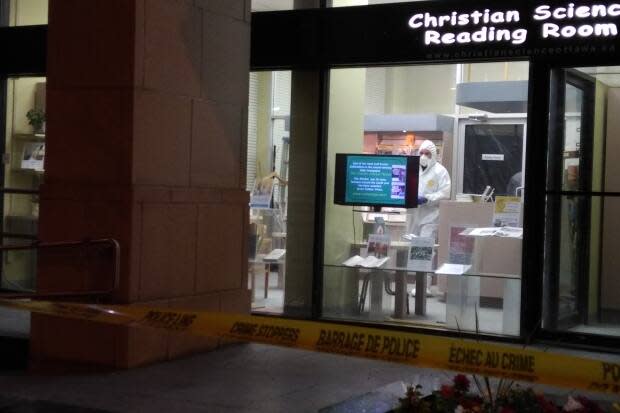Jury should consider intent, defence argues in closing statement at Tyler Hikoalok murder trial

The jury will return for instructions Friday morning as the trial of Tyler Hikoalok — accused in the 2018 murder of an Ottawa volunteer librarian — draws to a close.
Hikoalok has pleaded not guilty to first-degree murder in the death of 59-year-old Elisabeth Salm.
She was found beaten at the downtown Christian Science Reading Room, located on Laurier Avenue West on May 24, 2018.
Her co-worker discovered Salm shortly before her shift would've ended at 1 p.m. and immediately called 911.
The court previously heard that the co-worker saw Salm's face was bleeding, her pants and underwear were around one ankle.
Semen and other DNA samples were also collected from Salm's body. In total, 54 injuries were documented during the examination of her body.
"Two samples of Hikoalok's DNA were taken from the body of Ms. Salm," Crown prosecutor Brian Holowka said during Thursday's closing arguments.
'Irrefutably linked to the crime scene'
The lawyer went on to say that, not only could Hikoalok not be ruled out, but forensic evidence from a vaginal swab was "55 trillion times more likely" to be from Hikoalok than "an unknown individual unrelated to him."
Holowka also reminded the jury that Salm's blood was found on the bracelet Hikoalok wore, which "undeniably places him in close proximity to Elizabeth Salm."
"Tyler Hikoalok is irrefutably linked to the crime scene," he said.
Addressing the jury, defence lawyer Michael Smith sought to underline one point: Hikoalok didn't have the intent to kill the librarian that day.
While the defence didn't deny a sexual assault took place, he put the focus on Hikoalok's state of mind on that May morning.

The accused testified previously he'd been drinking vodka and rum that morning, blacked out, and woke up behind the bus stop the next day, Smith reminded the jury.
'That is not first-degree murder. That is manslaughter'
It was also determined by a doctor that Hikoalok likely suffers from fetal alcohol spectrum disorder.
"Given the state that he was in as a result of the alcohol, but not only the alcohol, but also as a result of this precondition, the brain damage that Dr. [Julian] Gojer told you about, that Tyler Hikoalok does not have the ability to form the intent to kill Elisabeth.
"And not only that, Tyler Hikoalok had no recollection of what transpired within that period of time."
Smith called whatever happened in that reading room "brief," and "impulsive" and said the end result was "unintentional."
"That is not first-degree murder," Smith said. "That is manslaughter."
First-degree murder is described in the criminal code as being planned and deliberate.
On the other hand, the Crown appealed to the jury to consider other pieces of evidence, including video surveillance, suggesting that Hikoalok did have the wherewithal to have the intent to murder.
"We see him make a decision and enter the reading room where Elizabeth Salm is alone," Holowka said.
He contended that video of Hikoalok leaving the building through a separate exit showed him "moving fast with a purpose."
The Crown pointed to the testimonies of others who recounted interactions with the accused on the day where he "appears unremarkable."

Hikoalok travelled to the Debbie Campbell Learning Academy at 440 Albert St. approximately 30 minutes after Salm was found beaten.
The Crown said a separate video showing Hikoalok entering the school again showed him "moving fairly quickly with purpose" and that he had changed his clothes.
"The evidence is inescapable that he meant to kill her," Holowka said. "The brutal extent of the attack leaves no doubt about this."
Holowka suggested the claim that Hikoalok was blacked out was a way to avoid difficult questions.
"I don't have to persuade you because the evidence speaks for itself," he said. "It speaks clearly. And it speaks loudly."

 Yahoo Movies
Yahoo Movies 
